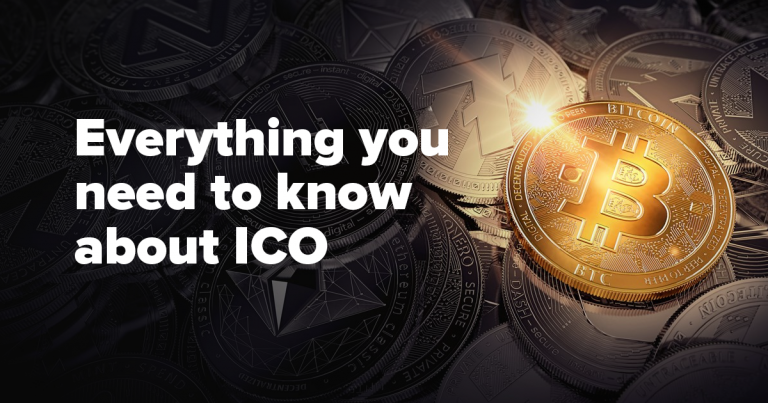Everything You Need to Know About ICO in 2025
What is an ICO?
Initial Coin Offering (ICO) is an unregulated alternative means of crowdfunding based on new digital cryptocurrencies that have emerged outside the traditional financial system. It recently boomed in popularity to becoming a major source of capital for start-ups.
Ever since the first set of ICOs – held by Omni Layer (formally Mastercoin) in 2013 and Ethereum in 2014 – completed, many more followed suit.
Over $3.2 billion was raised this year alone from sales of digital currencies to investors. This model helps a lot of projects and start-ups get the funding required to start their business.
Two emerging start-ups, Filecoin and Tezos currently have the largest coin offering to date of $257M and $232M respectively.
How does ICO work?
Start-ups raise money by creating and selling their own digital currency called tokens. The tokens are similar in make-up and characteristics to established digital currencies like Bitcoin and Ether.
Creating your own digital currency and initiating an ICO is not as complicated as it seems. ICOs usually take place on the Ethereum network, which is the leading blockchain (the technology behind digital currencies) and platform for ICOs.
The software behind both Ethereum and Bitcoin is open source, meaning the source code is freely available for anyone to modify and create their own digital currency using the Ethereum Smart Contract.
This is a computer protocol that facilities the transfer of digital assets between parties under the agreed terms of trade. If you’re not comfortable messing with code, there are companies willing to do this for you for a small fee.
Investors usually buy the new coins or tokens by sending the developers Bitcoin or Ether – the digital currency inside the Ethereum network. The purchased tokens are used exclusively on a computing service the developers build or promise to build.
For example, a start-up movie streaming service could sell subscription tokens to the public ahead of the launch and accumulate customers motivated to promote the service once it goes live.
However, convincing investors to buy your token or coin based on its future value is typically the difficult part, and many start-ups go bankrupt before they prove their worth.
Examining case studies of successful and failed ICOs can offer valuable insights into the potential rewards and risks associated with these investments. For instance, Ethereum's ICO in 2014 raised $18 million and has since become a cornerstone of the blockchain ecosystem. Conversely, Centra Tech's ICO, which raised $32 million, ended disastrously, with the founders being charged with fraud.
Why are people investing in these coins?
ICO fundraisers promise token-holders access to a future online service or application platform.
The tokens they sell are used as an entry ticket to the platform. In virtually all cases, there are no concrete products or service offered, only a promise.
Furthermore, people invest in coins because they hope the value will appreciate once the services promised by the developers are completed, thereby creating demand for the tokens.
What is the relationship between IPO and ICO?
Although inspired by Initial Public Offerings (IPO), Initial Coin Offering (ICO) is, in reality, different.
ICOs do not offer investors ownership of equities and most, if not all, projects behind ICOs don’t have an actual functional product or service.
Notwithstanding, ICOs are a cheaper alternative to IPOs because they do not rely on stock exchanges and its associated rigorous paperwork.
You can raise more money with ICOs as a start-up than you ever could from a stock exchange or venture capitalists.
Are ICOs legal or a scam?
As laws struggle to keep pace with advances in technology, regulatory gaps are inevitable.
The situation with ICOs is quite apparent; they're allowed in the majority of countries, but the exception is in China and South Korea, where their use is explicitly prohibited.
Countries like the US and UK are increasing regulatory oversight of ICOs, similar to their regulation of stocks and bonds, to balance innovation with investor protection. Switzerland's Financial Market Supervisory Authority (FINMA) and Singapore's Monetary Authority (MAS) have already set excellent examples by issuing comprehensive ICO frameworks that could serve as models for other jurisdictions. Meanwhile, ICO fundraisers and investors continue to enjoy significant freedoms.
ICOs can be used for a range of activities, from start-up fundraising and corporate finance to outright fraud. It can be difficult for the average investor to carry out due diligence on ICO projects and discern potential opportunities from grab-the-money-and-run schemes.
The US Securities and Exchange Commission (SEC) warned investors to beware of scammers using ICOs to execute "pump and dump" schemes.
This is where the scammers artificially inflate the price of an owned token through deceptive positive statements in order to sell off after the price is “pumped up” by the buying frenzy they create.
Once the operators of the scheme "dump" sell their overvalued tokens, the price falls and investors lose their money.
What do financial firms say about ICOs?
Love it or hate it, it’s getting increasingly harder for institutional investors to ignore digital currencies. Most financial firms are beginning to explore ways to leverage blockchain technology. There is growing interest and pressure from clients to track and even trade the digital coins.
For example, according to reports, Goldman Sachs is consulting with cryptocurrency experts to start a Bitcoin trading venture. A spokesperson for the company, Tiffany Galvin, was quoted saying: “In response to client interest in digital currencies, we are exploring how best to serve them in the space.”
But in a surprise divergent move, JPMorgan Chase CEO Jamie Dimon, called Bitcoin a fraud even though his bank still quotes Bitcoin prices. According to Reuters, Dimon said that “you can’t have a business where people can invent a currency out of thin air and think that people who are buying it are really smart. If any JPMorgan traders were trading crypto-currency, I would fire them in a second, for two reasons: It is against our rules and they are stupid, and both are dangerous.”
Others like Chris Dixon of Andreessen Horowitz (an American venture capital firm) argues that tokens could provide a model for the creation of open, decentralized networks and shared computing resources (computer, databases, and file storage), which – according to Chris – could help reverse the centralization of the Internet.
Should I invest in ICO?
Think carefully before investing in an ICO. It’s usually not that easy to ascertain the viability of projects from a business and technology standpoint.
Many ICO issuers promise unreasonable returns, although many investors have laughed all the way to the bank as some coins exploded in value. However, according to experts, the market is still characterized by huge volatility.
This is why some are calling on regulators to wield the big stick on irresponsible ICOs. Since there’s not much recourse, for now, the likely outcome is that investors will lose money when things go haywire.
It’s therefore wise, as usual, to never commit more money than you can afford to lose.






Please, comment on how to improve this article. Your feedback matters!